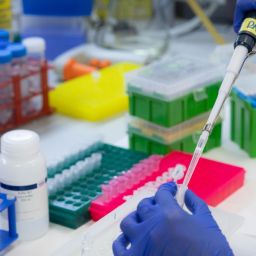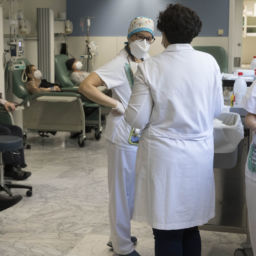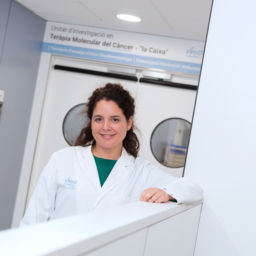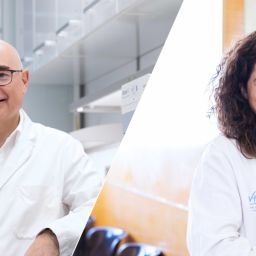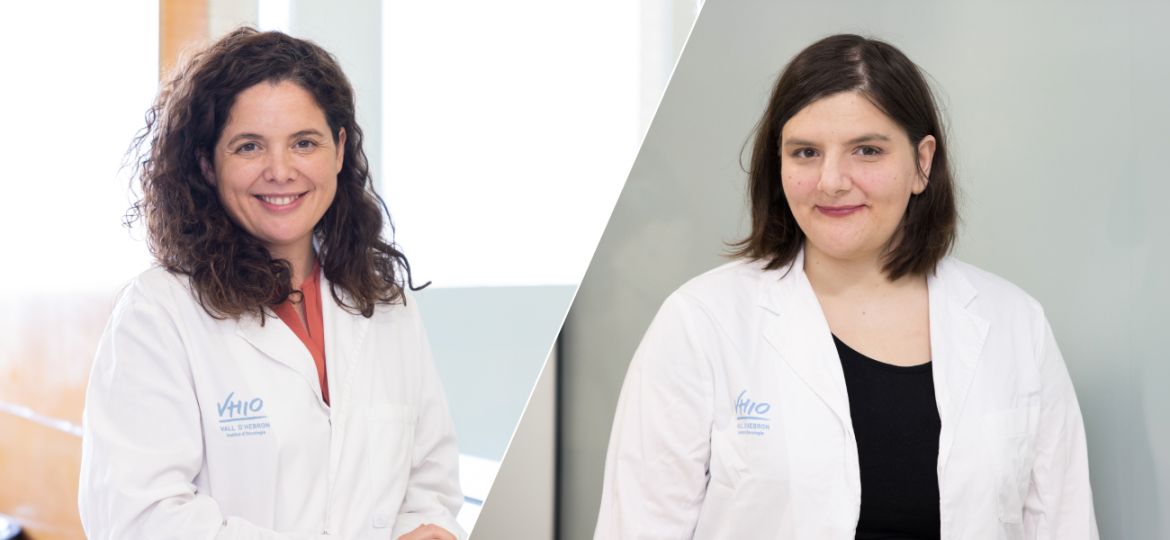
Advances driven by research have led to significant developments in better understanding the molecular taxonomy of cancer and therapeutic breakthroughs that have changed clinical practice. New and innovative anti-cancer medicines are increasingly selective and designed to target specific genetic and epigenetic alterations that play a crucial role in cancer growth and progression. These insights also enable investigators to discover novel biomarkers for identifying patients who are likely to respond to a given treatment, based on the individual molecular characteristics of their disease.
Clinical research teams of VHIO’s Early Clinical Drug Development Group and Research Unit for Molecular Therapy of Cancer (UITM) – CaixaResearch, both directed by Elena Garralda, (co) lead early phase clinical trials and first-in-human studies to evaluate the safety, optimal dosing and initial anti-tumor activity of emerging new therapies.
Results from two early phase clinical trials led by investigators of VHIO’s UITM-CaixaResearch, have been presented at the European Society for Medical Oncology Congress 2024*, 13 – 17 September, Barcelona, Spain.
The promise of a single-agent KRAS G12C inhibitor in patients with advanced solid tumors
The KRAS gene is one of the most commonly mutated oncogenes found across a broad spectrum of tumor types. As a key cancer driver gene, it represents a priority drug target for the more effective treatment of various cancers.
“While the structure of KRAS initially made it difficult to exploit it as a therapeutic target, KRAS G12C inhibitors have since been developed and have already entered the clinic. The estimated prevalence of KRAS G12C alterations is between 9 and 13% in non-small cell lung cancer and 3% in colorectal cancer,” said Elena Garralda, Medical Oncologist at the Vall d’Hebron University Hospital, Director of UITM-CaixaResearch, and lead investigator of this present study.
Divarasib is a novel, highly potent, and selective KRAS G12C inhibitor, capable of irreversibly blocking the protein by reverting oncogenic signaling. Results from a VHIO-led, ongoing phase I study, show that single-agent divarasib demonstrated durable clinical activity in patients with advanced or metastatic solid tumors with KRAS G12C mutation, and was well tolerated with few new-onset treatment adverse events after 1 year.
“At this ESMO Congress 2024, we have presented long-term follow-up results demonstrating that divarasib continued to show an acceptable safety profile and durable antitumor activity,” said Elena Garralda.
This study included 153 patients with locally advanced or metastatic KRAS G12C-positive solid tumors who had previously received standard therapy. No patients had prior KRAS G12C inhibitor treatment.
The overall response rate was 59.1% in patients with non-small cell lung cancer and 33.3% in pati3nts with colorectal cancer. Median progression-free survival was 15.3 months and 6.9 months respectively. Patients with other solid tumor types, including pancreatic cancer, had a durable response over time.
“The patients who received treatment with divarasib for more than one year tolerated it acceptably without serious adverse events,” concluded Garralda.
Novel RAF inhibitor shows encouraging clinical activity in RAF-mutated solid tumors
During the same Mini Oral session on Developmental Therapeutics*, Maria Vieito, Medical Oncologist at the Vall d’Hebron University Hospital, Clinical Investigator of VHIO’s Early Clinical Drug Development Group, and a CORE phase I Investigator of the UITM-CaixaResearch, presented results from the phase 2 DAY101 study evaluating novel RAF inhibitor tovorafenib as monotherapy in patients with recurrent, progressive or refractory melanoma, or other solid tumors with genetic alterations known as activating BRAF or CRAF gene fusions or CRAF amplification.
“BRAF fusions and RAF1 (CRAF) alterations are rare oncogenic drivers occurring in between 0.5% and 1.2% of all cancers,” said Maria Vieito.
Tovorafenib is an oral, selective, central nervous system-penetrant type 2 RAF inhibitor that recently received accelerated approval from the U.S. Food and Drug Administration for the treatment of relapsed or refractory low-grade pediatric glioma with BRAF alterations in patients older than six months of age.
DAY101 is a sub-study of the phase 1b/2 FIRELIGHT-1 open-label, multicenter clinical trial evaluating tovorafenib as monotherapy or in combination in patients with recurrent, progressive, or refractory solid tumors with MAPK pathway alterations.
“DAY101 included 23 patients with melanoma, central nervous system tumors or sarcoma harboring alterations in RAF, who received tovorafenib monotherapy. Data showed an overall response rate of 43% and a clinical benefit rate of 61% with a median duration of response of 9.2 months, and a manageable safety profile,” concluded Vieito.
The results from these two studies presented at ESMO Congress 2024 are promising and support the continued clinical development of these two novel agents in order to validate the safety and efficacy results toward their potential use in clinical practice.
“Advancing insights into the molecular characteristics of tumors together with clinical research will allow us to expand the therapeutic arsenal and provide more targeted therapies for the treatment of cancer,” concluded Elena Garralda.
###
*Session details
European Society for Medical Oncology Congress 2024, 13-17 September, Barcelona, Spain
Mini oral session: Developmental therapeutics
Date: Saturday, 14.09.2024
Time: 14:45 – 16:15h
Chairs: Teresa M. Amaral (Tübingen, Germany), Christophe P. Massard (Villejuif, France), Alex A. Adjei (Cleveland, United States of America)
614MO – Type II RAF inhibitor tovorafenib in recurrent/refractory (R/R) melanoma or other solid tumors with RAF fusions and/or RAF1 amplification
Speaker: Maria Vieito (Barcelona, Spain)
Lecture Time: 14:50 – 14:55h
616MO – Long-term follow-up of single-agent divarasib in patients with KRAS G12C-positive solid tumors
Speaker: Elena Garralda (Barcelona, Spain)
Lecture Time: 15:15 – 15:20h



